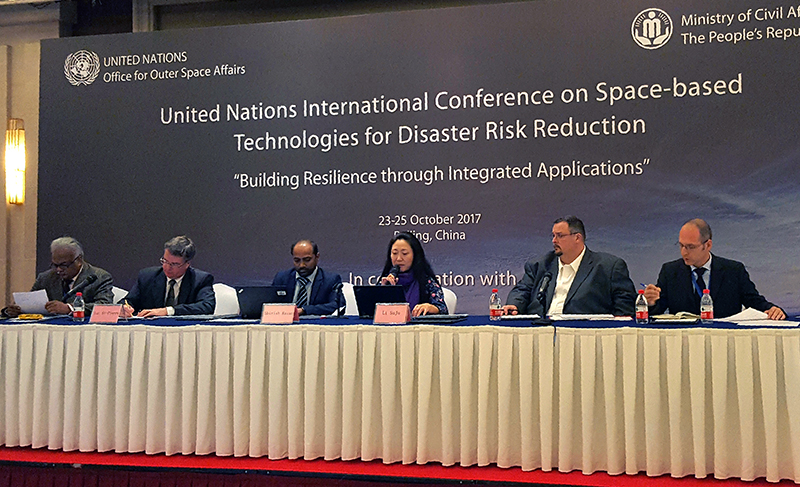
Talbot Brooks (second from right), director of the Center for Interdisciplinary Geospatial Information Technologies at Delta State University, speaks on a panel at a United Nations conference in Beijing, China on Oct. 25.
Talbot Brooks, director of the Center for Interdisciplinary Geospatial Information Technologies at Delta State University, provided an invited plenary lecture at the 7th annual United Nations International Conference on Space-based Technologies for Disaster Risk Reduction in Beijing, China on Oct. 25.
His presentation was titled “Application of Standards for Crisis Response and Risk Reduction” and was delivered to an audience of approximately 150 delegates from 44 nations. Brooks also hosted a plenary session about the latest space-based technologies for disaster risk reduction and participated as a member of the closing panel.
Brooks will be a contributing author for an upcoming United Nations policy paper about the use of space-based technologies, such as satellite imagery and GPS, for disaster risk reduction. He was also asked to present at the UNISPACE +50, a meeting celebrating the 50th anniversary of the first UN conference about the peaceful use of space. This meeting will take place in Vienna, Austria this coming summer (http://www.unoosa.org/oosa/en/ourwork/unispaceplus50/index.html).
Brooks has served as a technical advisor for the United Nations since 2008 and participated in technical advisory missions to Vietnam, Mozambique, Laos, Nepal, and the Republic of Georgia.
“Our work with the United Nations is important to DSU from several perspectives,” said Brooks. “First and foremost, dignitaries from the countries I work with have visited campus and interacted with our students. For example, visitors like Jaime Neto, a minister of parliament from Mozambique, toured our lab and participated in a panel discussion about Africa and GIS.
“Working with the UN has also helped us develop new funding opportunities that are now starting to mature and translate into grants. We were invited to bid on a contract with the Singapore Land Authority earlier this year, and through a senior-level contact made at this last meeting in China, we will submit a proposal to the UN World Food Program to develop a flood severity rating using GIS. Lastly, we are consistently the only U.S.-based university invited to participate in meetings and technical advisory missions focusing on the application of geospatial technologies to crisis and emergency response. It’s something we can be truly proud of and part of what President LaForge means when he talks about creating ‘signature programs.'”
Students from Delta State’s GIT Center students will also join Brooks this coming year for return visits to Vietnam and Mozambique, as well as a new mission to Sri Lanka.
Learn more about opportunities at Delta State’s Center for Interdisciplinary Geospatial Information Technologies at https://www.deltastate.edu/artsandsciences/geospatial-information-technologies.
The mission of the center is to provide geospatial services, accessible education and training, and institutional knowledge for geospatial information technologies to the widest possible audience, and particularly, the mid-Delta region.

